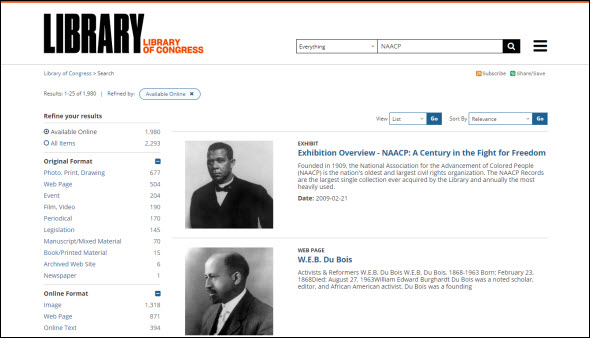On this day…
There is much to celebrate on this day… February 12th.
It’s the birthday of the 16th President of the United States, Abraham Lincoln.
Back in the Dark Ages, when The Legal Genealogist was a kid, we got this day off from school in addition to Washington’s Birthday.
But it’s not the only birthday to be celebrated on February 12. And it’s wonderfully fitting that the other birthday — one genealogists can celebrate joyfully as well — is that of one of the great bastions of the American civil rights movement.
For February 12 is also the birthday of the NAACP: the National Association for the Advancement of Colored People was founded on the 12th of February 1909.1
One hundred and eleven years of legal and political advocacy. One hundred and eleven years of education. One hundred and eleven years… of records.
An absolute plethora of records, to be precise.
Including manuscripts, photographs, prints, pamphlets, broadsides, audiotapes, phonograph records, films, and video recordings.
Many of them held in a public library that has served as the official repository of the NAACP since 1964.
The Library of Congress.2

Some 264 containers of records of the NAACP Legal Defense and Educational Fund for the years 1915-1968: “Records documenting the NAACP’s legal program through the mid-1960s and its coordinated attack on legal segregation and racial discrimination waged in state, federal and supreme courts. Includes administrative records, conference agenda, reports, committee files, correspondence and memoranda, notes, printed material, and legal case files.”3
Thousands of photographic prints, photomechanical prints, lithographs, engravings, and drawings: “Primarily photographs of national and local NAACP administrative staff and programs, with images of civil rights promotion efforts through litigation and public protest.”4
“But…” you say. “An awful lot of these records are in manuscript form, not digitized and not readily available from home.”
That’s true…
Except…
In 2011, the NAACP and ProQuest teamed up to digitize a large part of the association’s archives: “nearly two million pages of internal memos, legal briefings, and direct action summaries from national, legal, and branch offices throughout the country. It charts the NAACP’s work and delivers a first-hand view into crucial issues: lynching, school desegregation, and discrimination in the military, the criminal justice system, employment, and housing, among others. … The documents … provide insight into NAACP’s leaders and their relationships with the U.S. Congress, with presidents from Taft to Nixon, and with other civil rights organizations. The collection also documents the full range of civil rights tactics in the 1950s and 1960s, revealing a first-hand look at the important roles grassroots leaders and women played in the civil rights movement. Documents from local NAACP branches come from all 50 states and give additional depth and insight.”5
“But…” you say. “ProQuest is an expensive database available only through libraries and not to individuals at home!”
That’s also true…
Except…
Many major public libraries subscribe to ProQuest and access to the database may very well be available to library patrons, at home, using their library cards. That’s true, for example, at the New York Public Library and the Birmingham, Alabama, Public Library.
Huge numbers of colleges and universities subscribe as well, and allow access at home by those who have library cards from those institutions (which often includes alumni).
And even libraries that don’t allow access from home may very well offer access to patrons within their doors.
So, this February 12th, check out the records of the NAACP.
And … on this day … celebrate the birthdays … and the records we have to research as a result.
Cite/link to this post: Judy G. Russell, “The birthdays,” The Legal Genealogist (https://www.legalgenealogist.com/blog : posted 12 Feb 2020).
SOURCES
- NAACP History, NAACP.org (https://www.naacp.org/ : accessed 12 Feb 2020). ↩
- See “The NAACP Records,” Library of Congress Information Bulletin, March 2010, LOC.gov (https://www.loc.gov/ : accessed 12 Feb 2020). ↩
- “Collection Summary: NAACP Legal Defense and Educational Fund records, 1915-1968,” LOC.gov (https://www.loc.gov/ : accessed 12 Feb 2020). ↩
- Ibid., “Collection Summary: Visual materials from the National Association for the Advancement of Colored People records.” ↩
- “History Vault: NAACP Papers,” ProQuest LibGuides (https://proquest.libguides.com/ : accessed 12 Feb 2020). ↩



Charles Darwin, too. What a day!
It’s a state holiday in Missouri.